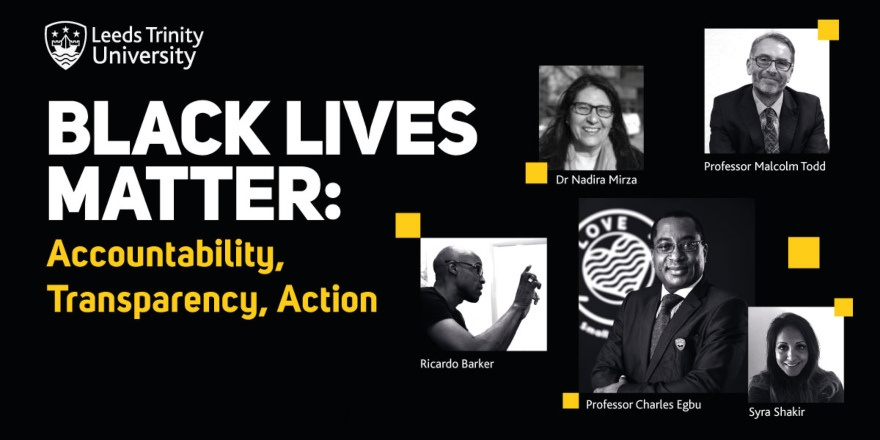
The workshop section of the recent Black Lives Matter event began with the showcasing of Re:Tension, which is a short film written, directed and produced by Senior Lecturer in Film Production Ricardo Barker. Ricardo was joined by alumnus Letsatsi Makhokolo, the first assistant director of the film, and Senior Teaching Fellow Syra Shakir, who helped develop the aftermath debate educational toolkit. Re:Tension follows Thapelo, a Black student who navigates institutional racism, unconscious biases and microaggressions in higher education. The film captures the often unnoticed microaggressions experienced by Black and Brown people and the accumulative effect this has on the individual.
Ricardo said that Re:Tension was inspired by the degree awarding gap and low retention levels of Black students which were highlighted during Leeds Trinity University’s pursuit of the Race Equality Charter Mark. Following the analysis of institutional data, Ricardo’s conversation with Letsatsi and other students who shared their lived experiences helped develop a picture of what was happening at Leeds Trinity.
Letsatsi spoke about his experience of working on the film, the research that went into the film and his own lived experience. Syra discussed the important role universities play in supporting Black students and staff and taking action. Ricardo discussed the role of Leeds Trinity which helped foster an environment where he could develop a film, challenge racism and that he will continue to take action moving forward.
The event closed with two poem recitals from Macy Iwediebo which she wrote in response to the Black Lives Matter movement and the murder of George Floyd. Macy’s poems captured the importance of hearing the lived experiences of Black people, police brutality and is a response to people who say, “all lives matter”. The poems captured the themes of accountability and action.
Here are some of the personal reflections from Letsatsi, Syra and Ricardo.
Letsatsi Makhokolo – Film alumnus
When you (Ricardo) approached me with a kind of concept to the film, I was instantly intrigued by it, because I could see it was going to be something important, it was different, and it was something I wanted to instantly be a part of straightaway. I think with this story in particular, it was something that I resonated with massively and I knew that a lot of people would. During the research process of the film, we learnt a lot about the retention gap and we didn't realise at the time how bad it actually was, but it wasn't until we did this research that we saw that it is a massive, massive issue and it just made it feel like we were working towards something really worth putting everything into.
Syra Shakir – Senior Teaching Fellow
We know working in higher education that the Black experience for students and for staff is significantly more negative. Our students and staff of Black backgrounds experience far more problems and not because of their academic abilities or their professional credibility, but because of external factors. So, we have a huge responsibility at University/within higher education and beyond to make sure that the voices of our Black students, of our Black staff are heard and that they are responded to with clear, defined actions. So, we have these talking spaces such as today's event and many other events but it's a continual conversation that takes place and it's a continual system of actions that we put into place to respond.
Ricardo Barker – Senior Lecturer in Film Production
I was so inspired and moved by what Macy, Jael, Chanelle, Rena and Letsatsi had to say (in their panel session). What they said was so powerful and moving. The event felt like an open community, and it's that spirit that enabled the Re:Tension to happen. When I was making the film, it was supported and encouraged throughout all areas of the University, nobody got in the way. When it was finished and screened to both friends and colleagues, it was truly engaged with and continues to be a source of discussion. I think it has a lot to do with the environment that the film was made in. I, as well as my close colleagues, intend to do a lot more work in this area.
We hope that these conversations continue and remain high on the agenda in higher education institutions and beyond. In the words of Macy Iwediebo “We must talk, they must listen”.
Shames Maskeen is a PhD researcher at Leeds Trinity University. You can revisit all the Black Lives Matter: Accountability, Transparency, Action sessions on YouTube.